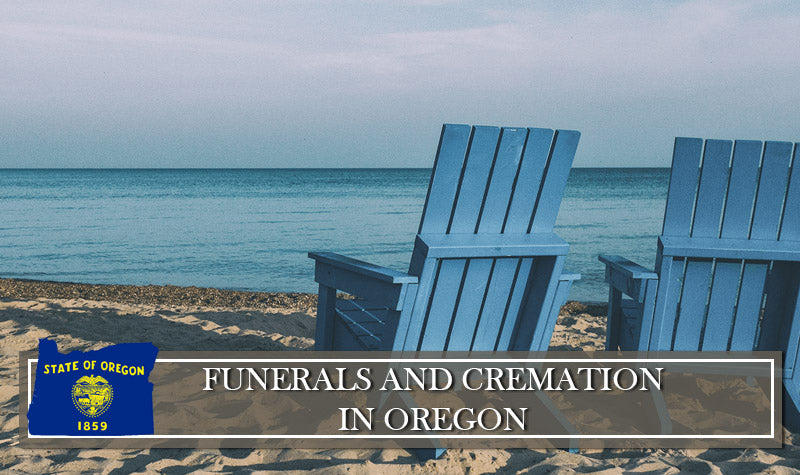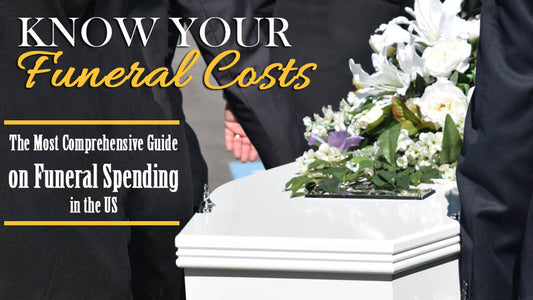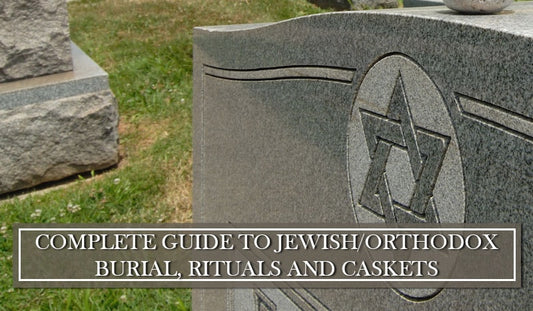
Rules and Regulations on Funerals, Burials and Cremation in Oregon
When you live in the U.S., you need to check the general regulations of the state you live in when planning a funeral or cremation. Just like with any other state across the U.S., Oregon also has specific rules and regulations on funerals and cremation. This guide will help you find out what they are.
What’s the procedure to follow for obtaining the death certificate in Oregon?
Most of the time, it’s the funeral director who takes care of the death certificate. In the state of Oregon, you have five days after death to request the death certificate. If cremation is to take place, the death certificate is also required.

The funeral director/person in charge of the deceased's affairs will ask for several certified copies. They will be necessary when asking for benefits or claiming properties that the dead owned. Payable on death accounts, Social Security benefits, life insurance proceeds, veteran benefits, and many other situations will require you to use legal copies of the death certificate. Anyone defined as the executor of the estate will need more than ten certified copies.
How many days should you wait for the death certificate?
Should you go in person, you can get it in 40 minutes, whereas regular mail will take 8-10 weeks. You need to wait two days if you’re asking for the certificate online. Expedited shipping is also available.
The original copy remains with the health department of the county, and you will be able to obtain a certified copy 7-10 days after the death. It will take around two weeks when the death occurs outside the Portland Metro Area.
You might order a copy of the death certificate no matter your relationship with the deceased if the death occurred 50 years ago.
What’s the price for a legal copy?
The price for a copy of the death certificate depends on the service you use, and it can vary from $20 to $36,50. Every other copy that you request will take $15 out of your pockets.
You need to present a photocopy if any form of identification when requesting the death certification. If you're ordering the certified copy by mail, you will pay $25. Any other copy is $25 each; certificates requested online, by phone, or in person, are pricier. You can claim it from Oregon's Public Health Division.
Who has the legal right to ask for a death certificate in Oregon?
In the state of Oregon, two kinds of death certificate can be emitted: the "short form" and the "long-form".
The short form
A short form doesn’t state the cause of death. The people/agencies capable of obtaining the death certificate would be as follows:
- The spouse or the domestic partner
- The adult child, parent, sibling, grandparent, adult grandchild, or the next of kin
- The legal guardian of the deceased, if applicable
- The legal representative of the deceased
- An agent/representative of the funeral home, as specified on the death certificate
- A person needing a copy of the death certificate for enacting a property of the personal right
- A government agency that has to use it for official business
The long-form
The cause of death is specified in the long form of the death certificate. Only some people or organization are legal to obtain copies of such an arrangement:
- The spouse or the domestic partner
- The adult child, parent, or next of kin
- The legal guardian of the deceased, if applicable
- The legal representative of the dead person
- An agent/employee of the funeral home according to the death certificate
- A government agency requiring the copy for official purposes
- Anyone needing the copy for naming a personal/property right
Who is legal to complete the death certificate?
The medical provider or the deceased’s primary who ensured medical care at the end is legal to fill in the medical certification. He/she has 48 hours to do it after accessing the medical records required for the filling.
Even the physician filling in the autopsy can complete the death certificate, as long as the medical provider isn’t available. It can also be done if the medical provider allows it.
What happens if the cause of death isn’t natural?
When the cause of death isn’t natural, the medical examiner has the responsibility to establish the reason, within 48 hours.
Should the cause cannot be identified in 48 hours or if it requires investigation, the medical examiner has to notify so on the death certificate. He/she can also release an affidavit on the cause of death to revise the record within five days after the autopsy.
What tips to follow when deciding for a funeral home in Oregon?
There are many things to handle when someone in your family dies, and selecting the funeral home is one of the many.

In the state of Oregon, it’s possible to choose from more than 250 funeral homes. You should decide which aspects matter the most for you when hiring the funeral home. The location, the services, or the funeral products you wish to purchase are some of the most common criteria used throughout the selection process.
Are you interested in having a conventional funeral or cremation? Would you like to have a contemporary funeral, or the green burial sounds better? Do you have a specific amount of money to spend for the funeral? The clearer the idea of the funeral, the easier it will be for you to select the funeral home. Make a list of the essential demands you have regarding the funeral and stick to it when choosing.
You can also ask your friends and family for their recommendations. When you want something specific, the suggestions may not be helpful. So it always comes down to what you want at the funeral.
How much money should you have for a funeral in Oregon?
$2,965 is how much a traditional funeral with burial costs in Oregon. It's a fundamental option, as the average expenses for a funeral is a little over $7,000. The price doesn't include the cemetery fees, though, so you may have to prepare around $9,000 for a regular funeral.
The kind of casket, the price for the cemetery plot and the grave marker are some of the many factors affecting the final spending for a traditional burial.
Most of the time, you will need to consider the service charges of the funeral director, embalming, the casket, transportation, and ancillary spending. Music, prayer cards, flowers, obituary, and many more make the auxiliary expenses.
Prices are different from one funeral home to another, but every single funeral home should give you a general price list (GPL). The record notes the service charges and the funeral merchandise costs. The funeral home is also obliged to give you a copy of the GPL when quoting you a price.
Is cremation cheaper than a funeral in Oregon?
Once again, you need to think about the ancillary services and products you will also have. Expect to pay $3,000 or so for a typical cremation funeral service.
A simple direct cremation can be as low as $900, whereas traditional funeral with cremation can be as pricey as $4,000.
Who has to pay for funeral spending in Oregon?
Anyone can have two options: prepay or leaving enough money for the family to cover funeral spending.
When none of the options is available, the family may apply for a funeral bill.
Pre-planning a funeral in Oregon
The Pre-planning of the funeral is going to reduce the pressure and stress of family when dealing with the funeral arrangements.
It's possible to buy burial insurance to establish preneed funeral arrangements with the funeral home directly. Don't forget to see the preneed contract is "non-guaranteed" or "guaranteed."
Bear in mind that every single buck you put in a trust will show in the annual reporting to the Oregon State Dept. Finance and Corporate Securities Division.
Are there rules on embalming in Oregon?
No state laws or legal requirements exist to regard to mandatory embalming in the state of Oregon. Oregon Mortuary and Cemetery board state that embalming or refrigeration are necessary when the final disposition of the remains doesn't take place within 24 hours of death.
Here are the situations when embalming is requested by law:
- When more than 24 hours have passed since the death, and the body is shipped to another location, and the shipping lasts for more than six hours, embalming is required. If the body is placed in a sealed rigid container, the embalming isn't requested by law.
- When the cause of death is a specific contagious condition, and the body is shipped, embalming is also requested. If any religious customs or believes forbid embalming, the body has to be shipped in a proper and sealed container.
- If public viewing or funeral service takes place and the body is removed from refrigeration for more than six hours, embalming is mandatory.
- If the cause of death is a contagious illness, and there is public viewing, the body must also be embalmed.
Is the casket indispensable by law in Oregon?
Even if casket prices can start at $800 (or even less) at online retailers, most of the time, the casket is the principal investment in a funeral. The materials used for the coffins generate the final price, which is why you can find caskets up to $20,000.
See our selection of caskets, shipped fast throughout the entire State of Oregon.

Is it mandatory to get the casket from a funeral home?
In the state of Oregon, no laws require you to buy the casket exclusively from the funeral home. The federal laws require the funeral homes to take in caskets that the clients bought elsewhere. Online retailers provide numerous models with prices fitting budgets of all sizes.
Burial
There are no laws in Oregon obliging you to purchase a casket. However, the cemetery may present some specific rules on the type of container that they accept. Make sure you check with the representative of the cemetery before buying a casket.
Cremation
The federal law in Oregon State require the crematory/funeral home to offer you the cremation caskets or alternative containers. They’re also obliged by the law to give the chance of buying the cremation casket from any third party casket provider.
Pressed wood, fiberboard, unfinished wood, or cardboard are the standard prices for the alternative containers, which also explain the lower rates.
What to consider when deciding between a burial and a cremation in Oregon?
5 out of 10 funerals in Oregon is a cremation, which turns into the no.1 choice for people in Oregon when it comes to disposal of the remains.
If the deceased has stated specific requests on the final disposal of the remains, it's easier for the surviving family to take care of the funeral. With cremation being the more affordable choice than the traditional burial, it's understandable why do people choose it so often.
The other options
In the state of Oregon, people can also opt for green burials, which are similar to traditional funerals. Everything related to the burial, from the clothing of the deceased to the casket, and tools used for digging the grave, should be eco-friendly.
Aquamation or bio-cremation is also legal to have in the state of Oregon.
Is the direct cremation lawful in Oregon?
A direct cremation stands out as the cheapest option in terms of disposal of the remains. With direct cremation, there are no services involved, and the cremation happens the moment the documentation is filled in. Afterward, the cremated remains will be offered to the family in a temporary recipient.
People can also opt for family viewing and upgraded cremation in the case of basic direct cremation, in which the spending will increase.
Which are the proper places to bury the remains in Oregon?
The majority of bodies are buried in settled cemeteries in Oregon. Regardless, the burial on private land is also available.
In the state of Oregon, you will need to set a cemetery in the following situations:
- You possess the property.
- You agree to keep the records of burials if the governing body of the city or the county requests you.
- Should you sell the property, you agree to disclose the burials.
- You have the written permission from the city or county planning commission. When there is no city or county planning commission, the governing body of the city/county has to allow you the establishment of the cemetery.
Keep in mind that the county or city planning commission may still have specific requirements. You need to draw a map of your land, displaying the burial ground if you're burying a body on private property. It's also mandatory that you file it with the property deed so that the location is apparent in the future.
What are the legal aspects related to cremation?
Every state has its own rules and regulations on cremation processes. For instance, the crematory and/or has to follow specific practice standards when it comes to the disposal of cremated remains.
In the state of Oregon, the “Cremation Authorization Form" has to be released before cremation takes place. It’s also mandatory for the form to be signed by the next of kin and the coroner. You only need to pay $7.00 for the cremation permit.
The mandatory waiting period before cremation occurs 24 hours. All in all, you will need three days or so to make all the preparations and to complete all papers. You may opt for expedited service as well.
What are the regulations in Oregon regarding the scattering of ashes?
Since the rate of cremation is quite high in the state of Oregon, the interest of people for different ways of memorializing the remains is also significant.
It’s possible to inhume the cremated remains in a cremation niche or a grave plot. One can also store the remains in urns or spread the ashes.
There’s also the possibility of going with cremation artifacts made from the cremated remains. Glass jewelry, cremation diamonds, birdbaths, and portraits are only some of the numerous options.
As for spreading the ashes, you should always use common sense when scattering.
Private property
You may spread the cremated remains on private property. Should you want to scatter ashes on someone else's property, you need the permission from the owner.
Public land
Even though it’s legal, you have to find out the city and county regulations and zoning requirements before spreading ashes on local public property. Use your common sense if doing so.
Established scattering garden
Plenty of cemeteries provide private gardens for spreading the ashes. Talk to a cemetery employee for more details.
Federal property
permission is necessary before spreading ashes on federal land. If you intend to do it on a state or local land, the chances are that nobody will forbid you from scattering the ashes. Just make sure that you spread them away from roads, trails, waterways, and facilities.
At sea
According to the federal Clean Water Act, you need to be three nautical miles from the land if you wish to spread the cremated remains at sea. When the remains are placed in a container that doesn't decompose quickly, you will need to dispose of it later on.
The EPA defines as unlawful the spreading of cremated remains at beaches or in wading pools by the sea. We also need to mention that you have 30 days to inform the EPA before the spreading of the ashes.
If you wish to have an inland water burial, you must obtain the permit from the state agency managing the specific waterway.
By air
No state laws in Oregon forbid you from spreading the ashes by air. Regardless, federal aviation laws will consider illegal any dropping of objects that may cause injury people or affect properties. Always remove the ashes from the container before spreading them by air. The U.S. government doesn't define cremated remains as harmful in any way.
Is it legal to have alkaline hydrolysis in Oregon?
Ever since 2009, alkaline hydrolysis was legalized in the state of Oregon. Cremation, burial, internment, dissolution, and other disposition of human remains are considered to be final disposition.
As for alkaline hydrolysis, we should highlight that it’s chemical process reducing the body only to bone and liquids. It doesn’t generate any matter into the atmosphere and uses less energy than cremation, which is why it represents a greener option than cremation.
The state’s Mortuary and Cemetery Board regulated the alkaline hydrolysis in the state of Oregon. Many funeral homes perform alkaline hydrolysis in the state of Oregon.
FAQs
Q: Is the grave marker mandatory in Oregon?
A: No laws are obliging you to use a grave marker in Oregon. You only need to check with the cemetery to see how high above the ground the grave marker can go. Also, you should wait a while for the land to settle before installing the grave marker.
Q: Does the state of Oregon provide benefits for veterans?
A: Veterans have specific benefits, from free cemetery plot to U.S. flag and a grave marker. Anyone requesting the benefits has to present a copy of the DD214 discharge papers. It's also needed to get in touch with the local V.A. office.
The funeral director will address this sort of situation. There is space for the ashes and caskets at the VA cemeteries in Portland and Eagle Point. In Roseburg, there's the only place for cremated remains.
Q: What's the best way to transport the loved one back to/from Oregon after death?
A: When you have to transport the deceased back to the country/state of origin, you should hire a funeral director capable of making this kind of funeral arrangements. He/she is able to coordinate all the funeral arrangements at the place of death and destination place of the body.
If you're going to send the body within the United States, you can do it by land or by plane. Most of the time, embalming will be needed, and a particular container has to be used for transportation.
With the shipping of the body being quite pricey, you should also consider the cremation of the body at the place of death.
Q: Does the state of Oregon allow the donation of the body?
A: Donating the body to science is a selfless way to give back to society. It's possible to pre-register for the more straightforward process once the death occurs.
Q: How to cover the funeral spending if the deceased had no life insurance?
A: It's challenging to deal with the funeral arrangements for the deceased, especially when you don't have enough money. The financial help for funerals is limited and may differ from one county to another.
Typically, the coroner will address the matter along with the funeral home. The expenses shouldn't be higher than the minimum spending of burial or cremation. The county or the state will pay for pauper burial support, as there is a fixed amount set. Get in touch with the local County human services/social services to check your options. Keep in mind that simple cremation is the most affordable option for the disposal of the remains.
Q: What can you do when filing a complaint against a funeral home in Oregon?
A: Even if the majority of funeral homes are reliable and trustworthy, accidents still happen. A written complaint to the Oregon Mortuary and Cemetery Board is one solution to try. It's the organization regulating and licensing the funeral businesses in Oregon.
The Oregon Cremation Alliance is another resource to check when filing complaints about a funeral home.
Blog Author: Tim





